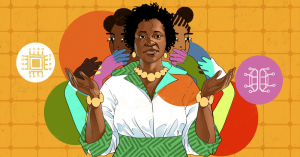EDITOR'S FOREWORD
On Wole Soyinka
Our latest issue, The Enduring Voice of Wole Soyinka, celebrates the 90th birthday of Wole Soyinka and considers his influence on literature, African thought, plus more.
COVER INTERVIEW
The Enduring Voice of Wole Soyinka
As he turns 90, Wole Soyinka discusses the current state of the world, the power of African literature, the social climate in Tinubu’s Nigeria, and the world ahead.
COVER ESSAY
What Wole Soyinka Means to Me
A native daughter reflects on the life and legacy of a literary giant.
COVER ESSAY
Soyinka in the Gazan Crypt
Wole Soyinka’s work gives to Palestinians something the life-world of Palestinian letters give to us: an abiding love and solidarity for the captive.
THE MINISTRY OF ARTS / BOOKS DEPT.
The World After Wole Soyinka’s Climate of Fear
First presented as Reith Lectures exactly 20 years ago, what does it mean to revisit Wole Soyinka’s Climate of Fear in today’s chaotic world?
THE MINISTRY OF ARTS / POETRY DEPT.
A Walk Through Wole Soyinka’s ‘Àbíkú’
An anthropological attempt at unravelling Wole Soyinka’s rewardingly obscure poem, ‘Àbíkú’.
THE MINISTRY OF ARTS / THEATRE DEPT.
The Dramatic Procedures of Wole Soyinka
Wole Soyinka’s legacy as a dramatist is a testament to what a proper cultural education, clear ambition, and strict commitment to craft can produce.
THE MINISTRY OF ARTS / THEATRE DEPT.
Death and the King’s Horseman at the Stratford Festival
The successes and challenges behind the production of one of Nigeria’s most iconic theatre works on a Western stage.

THE MINISTRY OF CULTURAL AFFAIRS
The Coming-of-Age Novel as a Portrait of Nigeria
The bildungsroman is the novel of Nigeria. No other kind of novel captures completely what it means to be Nigerian in the volatile, high-velocity, interconnected world of the twenty-first century.
THE MINISTRY OF GENDER X SEXUALITY
An African Feminist Reading of Wole Soyinka
Feminist scholars have often debated the portrayal of women in Wole Soyinka’s works, who typically navigate patriarchal societies. In Soyinka’s plays, Death and the King’s Horseman and The Lion and the Jewel, however, we find women who operate within the confines of tradition and strategically redefine their roles through acts of defiance.
THE MINISTRY OF MEMORIES
Remembering Kampala
For much of the sixties, Kampala was at the centre of literature in Africa, its status propelled by Makerere University and Rajat Neogy’s Transition Magazine. However, in the seventies, the violence of Idi Amin forced intellectuals and artists to flee the Ugandan capital and led to the end of Kampala’s cultural dominance in Africa.
THE MINISTRY OF IDEAS
Revisiting the Soyinka-Bọ́lẹ̀kájà Debate
Since the landmark Soyinka-Bọ́lẹ̀kájà debate of the 1980s, African poetry has sparked intense discussions about authenticity and the influence of Western literary traditions and forms on its poets.
THE MINISTRY OF IDEAS
Négritude Since Wole Soyinka
Despite Wole Soyinka’s engaging, critical views about Négritude, why has the movement remained relevant in shaping Africa’s history, philosophy and literature?
THE MINISTRY OF WORLD AFFAIRS
The North African Novel in English: What Is It? How Is It?
Arabophone and Francophone literatures have dominated the region of North Africa for decades, but now a third one is emerging—the Anglophone one.
THE MINISTRY OF WORLD AFFAIRS
Fiction as National Memory in the Age of Mass Protests
Considering the 2024 Kenyan Gen Z protest, and the rising discontent among African youths, can literature play the role of lens in times of moral crisis, that too for a population that doesn’t read?
FIRST DRAFT
‘Writing Comes From a Place of Danger and Struggle’ Patrice Nganang’s First Draft
Cameroonian academic and author of Dog Days, Patrice Nganang, says social media has led to his transformation as a writer: ‘Social media led to my imprisonment, helped me free a few hundred people from jail, build schools and bridges, and feed incarcerated individuals. Simply put, it made me the writer I always dreamed of becoming.’
the cover
‘Kongi’s Harvest,’ by Diana Ejaita
BUY the COVER + MORE
SPECIAL THANKS
Editors: Wale Lawal, Yusuf Omotayo, Peace Onafuye and Victoria Audu
Issue Design: Wale Lawal and Dami Mojid
Illustrators: Ekundayo R. Baiyegunhi, Sarah N. Kanu, Kevwe Ogini, Charles Owen and Dami Mojid
Funding Partner: The Open Society Foundations



































